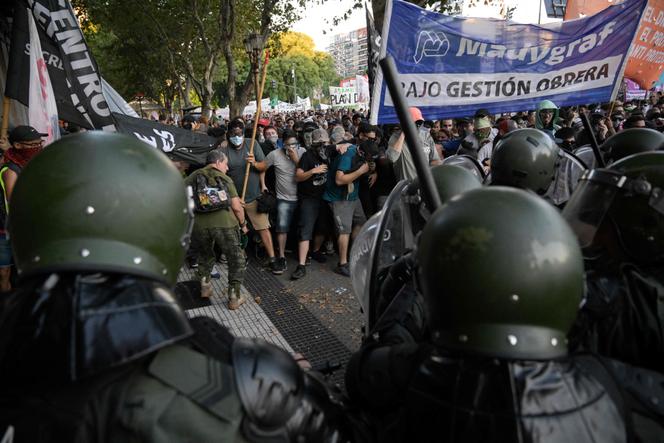


A can of oil, cartons of milk, bread, grated cheese: "It's the third time in four months that we've come here and we are already buying less. Everything's going up," said Walter, a 36-year-old garage mechanic. He pointed to his cart outside a food wholesaler in Buenos Aires. "We can last 20 days on this, but we also have to add vegetables and meat. Half my salary [330,000 pesos, 367 euros at the official rate] goes on these purchases," said the young man, next to his partner, Julieta, 35.
Julieta juggles two jobs as a schoolteacher and administrative employee – an undeclared extra form of income. "I work 12 hours a day and I work like a dog," she said under her breath. "It's enough to make you feel powerless." Vacations during the austral summer, even near the capital, have been unthinkable for the past four years. The consolation for the 30-somethings is a glass of Fernet, a bitter alcohol originating in Italy, widely available in Argentina, in the evening at home and, above all, football. "We're keeping our stadium season ticket. It's all we care about!" said Julieta, lighting up.
The couple are among Argentina's small middle class, hit by inflation that never seems to let up. Systematically in double digits since 2007, it reached a three-decade high of 211% in 2023 during the last year of Alberto Fernandez's center-left government. And, for the past month, the spiral has accelerated due to the impact of the first measures imposed by President Javier Milei, in power since December 10, 2023.
The far-right libertarian had promised a dramatic change to Argentina's economy, and he enacted it fast. As early as December 12, the government announced austerity measures such as cuts in public aid for transport and energy bills. An abrupt devaluation of the peso, of over 50%, was set in motion. Its effect on prices was immediate with 25.5% inflation in December. According to private economic research institutes, it is set to get to 20% in January but wages are not keeping pace.
In the wake of this, a "megadecree" containing over 300 articles amending or repealing existing laws came into force on December 29. The reform of labor law, a crucial part of the law, was temporarily suspended, then declared unconstitutional in January. The Supreme Court has yet to give its verdict, and the entire text may yet be rejected by Parliament, provided that both chambers reject it.
But in the meantime, the texts are already palpable: the end of price controls on basic necessities, the end of rent controls, the end of ceilings on increases in health insurance premiums. In addition, a bill moving in the direction of deregulation of the economy is currently under discussion in Parliament.
You have 70% of this article left to read. The rest is for subscribers only.
